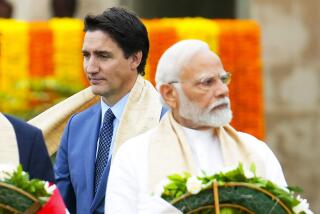Pakistan, India Still Far Apart as Summit Ends
- Share via
NEW DELHI — India and Pakistan failed to make a breakthrough in their long conflict over Kashmir during a foreign ministers’ summit that ended Monday with little progress beyond a commitment to keep trying.
The ministers repeated entrenched positions on the 57-year dispute over the divided territory, highlighting the wide gulf between the countries that remains after more than eight months of negotiations.
At the close of the two-day talks, Indian Foreign Minister K. Natwar Singh reminded his counterpart Mian Khursheed Mehmood Kasuri that Pakistani President Pervez Musharraf had agreed Jan. 6 to ensure that no territory under Pakistan’s control was used to support terrorism in any way.
“Cross-border infiltration [by militants] remains a serious concern,” Singh said, standing beside a grim-faced Kasuri.
The Pakistani foreign minister had his own reminder for the Indian government -- Kasuri told Singh that India’s security forces continued to commit abuses in Jammu and Kashmir despite a commitment to end them.
A European Union delegation that visited Kashmir last month concluded that its people suffer widespread human rights abuses such as arbitrary arrest, detention and murder at the hands of Indian police and soldiers. One member of the delegation called the Himalayan territory “the most beautiful prison in the world.”
The Kashmir dispute involves “complex problems,” Kasuri said Monday.
“But I do not believe that they are intractable,” he added. “Given the political will, they can be resolved, and they should be resolved.”
Acknowledging that the peace process has produced limited results, Singh said: “Diplomacy provides hope, not salvation. Even modest progress is worthy of respect. And we have made progress in the past few days.”
In the 57 years since Britain granted independence to the subcontinent, India and Pakistan have fought three full-scale wars, and the now nuclear-armed nations almost started a fourth in 2002.
Previous peace efforts have delivered dramatic agreements that quickly fell apart. So this time, the two countries are trying to build steady momentum from measured progress, working more to avoid breakdowns than to achieve breakthroughs.
Perhaps their greatest diplomatic success so far is a cease-fire announced in November, which ended regular artillery battles between hundreds of thousands of troops deployed at the de facto border in Kashmir.
The governments renewed their commitment to the cease-fire Monday, but Pakistan hasn’t been able to persuade India to cut the number of troops there.
When the current negotiations started, Musharraf promised Pakistanis that they would know by the end of this year whether a peaceful settlement of the Kashmir conflict was possible.
But India has resisted pressure to focus on Kashmir and insists that there must be simultaneous progress on all bilateral issues, such as trade ties and energy projects. These are higher priorities for India, whose economy dwarfs Pakistan’s.
“We are discussing the Jammu and Kashmir issue frankly and respecting each other’s views on this,” the Indian foreign minister said Monday. “This will not hold up progress in other areas.”
Neither minister pointed to progress on a proposed bus route across the Line of Control, a 1971 cease-fire line that divides the territory of Jammu and Kashmir between India and Pakistan.
The bus service would reunite Kashmiri families and could boost prospects for a settlement. But the idea is bogged down by technical issues, such as who would be allowed to ride the bus and what kind of travel documents they must carry.
Musharraf and Indian Prime Minister Manmohan Singh will have an opportunity to move the peace process forward during a meeting this month on the sidelines of the U.N. in New York.
Despite deep differences over Kashmir, the Indian and Pakistani diplomats repeated Monday that their countries want the peace process to succeed.
“India is committed to deepen and widen its engagement with Pakistan in order to resolve all issues and to build an endurable structure of peace and stability in South Asia, free from an atmosphere of terrorism and violence,” Singh said.
More to Read
Sign up for Essential California
The most important California stories and recommendations in your inbox every morning.
You may occasionally receive promotional content from the Los Angeles Times.










